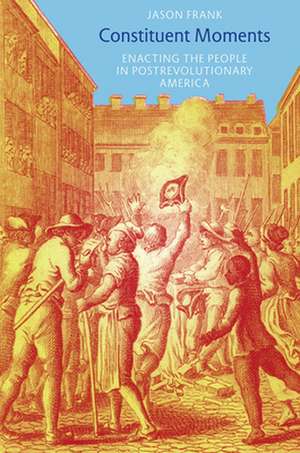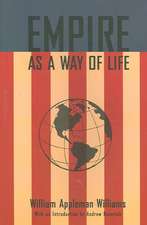Constituent Moments – Enacting the People in Postrevolutionary America
Autor Jason Franken Limba Engleză Paperback – 3 ian 2010
Preț: 302.19 lei
Nou
Puncte Express: 453
Preț estimativ în valută:
57.83€ • 62.80$ • 48.58£
57.83€ • 62.80$ • 48.58£
Carte tipărită la comandă
Livrare economică 22 aprilie-06 mai
Preluare comenzi: 021 569.72.76
Specificații
ISBN-13: 9780822346753
ISBN-10: 0822346753
Pagini: 360
Ilustrații: 2 illustrations
Dimensiuni: 159 x 234 x 26 mm
Greutate: 0.52 kg
Editura: MD – Duke University Press
ISBN-10: 0822346753
Pagini: 360
Ilustrații: 2 illustrations
Dimensiuni: 159 x 234 x 26 mm
Greutate: 0.52 kg
Editura: MD – Duke University Press
Recenzii
Jason Frank has written an essential work of scholarship, a book that is destined to become a primary resource for democratic theorists, scholars of American political thought, historians of the postrevolutionary era, and anyone else who is interested in seeing the politics of democratic revolution in a new light.Thomas Dumm, author of A Politics of the Ordinary
Constituent Moments is the best book on the founding of the United States to have been written in several generations. Jason Frank goes beyond American political history, opening an old question from The Leviathan: The People: What? This question is at the heart of democratic sovereignty. Jason Franks careful attention to canonical political theory and his attentive study of those who acted in the name of the people enables him to follow, as few could, in the footsteps of Thomas Hobbes. This is a genuinely brilliant book.Anne Norton, author of Leo Strauss and the Politics of American Empire The people is a political claim, says Jason Frank in this magnificent book. If that claim has power, that is because American democracy is the beneficiary of a constitutive surplus inherited from the revolutionary era. Frank adds to the surplus by tracking, mobilizing, enhancing the slippage between the people as fact and aspiration, fragmentation and ideal. Attentive to imagination, representation, and voice, he finds new resources for democratic theory in both Hannah Arendt and the crowds she mistrusted, in Whitmans homoerotic poetry but also in its (re)production, in the gothic conundra of voice and representation explored by Brown novelistically and by Rancière theoretically. Cutting across genres usually segmented by disciplinary division, Franks text is rich in historical detail and theoretical nuance. A must-read for anyone interested in democratic theory, sexuality studies, racial politics, political theology, and new realist approaches to the politics of citizenship.Bonnie Honig, author of Emergency Politics: Paradox, Law, Democracy
"Jason Frank has written an essential work of scholarship, a book that is destined to become a primary resource for democratic theorists, scholars of American political thought, historians of the postrevolutionary era, and anyone else who is interested in seeing the politics of democratic revolution in a new light."--Thomas Dumm, author of A Politics of the Ordinary "Constituent Moments is the best book on the founding of the United States to have been written in several generations. Jason Frank goes beyond American political history, opening an old question from The Leviathan: 'The People: What?' This question is at the heart of democratic sovereignty. Jason Frank's careful attention to canonical political theory and his attentive study of those who acted in the name of the people enables him to follow, as few could, in the footsteps of Thomas Hobbes. This is a genuinely brilliant book."--Anne Norton, author of Leo Strauss and the Politics of American Empire "'The people is a political claim,' says Jason Frank in this magnificent book. If that claim has power, that is because American democracy is the beneficiary of a 'constitutive surplus inherited from the revolutionary era.' Frank adds to the surplus by tracking, mobilizing, enhancing the slippage between the people as fact and aspiration, fragmentation and ideal. Attentive to imagination, representation, and voice, he finds new resources for democratic theory in both Hannah Arendt and the crowds she mistrusted, in Whitman's homoerotic poetry but also in its (re)production, in the gothic conundra of voice and representation explored by Brown novelistically and by Ranciere theoretically. Cutting across genres usually segmented by disciplinary division, Frank's text is rich in historical detail and theoretical nuance. A must-read for anyone interested in democratic theory, sexuality studies, racial politics, political theology, and new realist approaches to the politics of citizenship."--Bonnie Honig, author of Emergency Politics: Paradox, Law, Democracy
Constituent Moments is the best book on the founding of the United States to have been written in several generations. Jason Frank goes beyond American political history, opening an old question from The Leviathan: The People: What? This question is at the heart of democratic sovereignty. Jason Franks careful attention to canonical political theory and his attentive study of those who acted in the name of the people enables him to follow, as few could, in the footsteps of Thomas Hobbes. This is a genuinely brilliant book.Anne Norton, author of Leo Strauss and the Politics of American Empire The people is a political claim, says Jason Frank in this magnificent book. If that claim has power, that is because American democracy is the beneficiary of a constitutive surplus inherited from the revolutionary era. Frank adds to the surplus by tracking, mobilizing, enhancing the slippage between the people as fact and aspiration, fragmentation and ideal. Attentive to imagination, representation, and voice, he finds new resources for democratic theory in both Hannah Arendt and the crowds she mistrusted, in Whitmans homoerotic poetry but also in its (re)production, in the gothic conundra of voice and representation explored by Brown novelistically and by Rancière theoretically. Cutting across genres usually segmented by disciplinary division, Franks text is rich in historical detail and theoretical nuance. A must-read for anyone interested in democratic theory, sexuality studies, racial politics, political theology, and new realist approaches to the politics of citizenship.Bonnie Honig, author of Emergency Politics: Paradox, Law, Democracy
"Jason Frank has written an essential work of scholarship, a book that is destined to become a primary resource for democratic theorists, scholars of American political thought, historians of the postrevolutionary era, and anyone else who is interested in seeing the politics of democratic revolution in a new light."--Thomas Dumm, author of A Politics of the Ordinary "Constituent Moments is the best book on the founding of the United States to have been written in several generations. Jason Frank goes beyond American political history, opening an old question from The Leviathan: 'The People: What?' This question is at the heart of democratic sovereignty. Jason Frank's careful attention to canonical political theory and his attentive study of those who acted in the name of the people enables him to follow, as few could, in the footsteps of Thomas Hobbes. This is a genuinely brilliant book."--Anne Norton, author of Leo Strauss and the Politics of American Empire "'The people is a political claim,' says Jason Frank in this magnificent book. If that claim has power, that is because American democracy is the beneficiary of a 'constitutive surplus inherited from the revolutionary era.' Frank adds to the surplus by tracking, mobilizing, enhancing the slippage between the people as fact and aspiration, fragmentation and ideal. Attentive to imagination, representation, and voice, he finds new resources for democratic theory in both Hannah Arendt and the crowds she mistrusted, in Whitman's homoerotic poetry but also in its (re)production, in the gothic conundra of voice and representation explored by Brown novelistically and by Ranciere theoretically. Cutting across genres usually segmented by disciplinary division, Frank's text is rich in historical detail and theoretical nuance. A must-read for anyone interested in democratic theory, sexuality studies, racial politics, political theology, and new realist approaches to the politics of citizenship."--Bonnie Honig, author of Emergency Politics: Paradox, Law, Democracy
Notă biografică
Jason Frank is the Gary S. Davis Assistant Professor in the History of Political Thought at Cornell University.
Textul de pe ultima copertă
"'The people is a political claim, ' says Jason Frank in this magnificent book. If that claim has power that is because American democracy is the beneficiary of a 'constitutive surplus inherited from the revolutionary era.' Frank adds to the surplus by tracking, mobilizing, enhancing the slippage between the people as fact and aspiration, fragmentation and ideal. Attentive to imagination, representation, and voice, he finds new resources for democratic theory in both Hannah Arendt and the crowds she mistrusted, in Whitman's homoerotic poetry but also in its (re)production, in the gothic conundra of voice and representation explored by Brown novelistically and by Ranciere theoretically. Cutting across genres usually segmented by disciplinary division, Frank's text is rich in historical detail and theoretical nuance. A must-read for anyone interested in democratic theory, sexuality studies, racial politics, political theology and new realist approaches to the politics of citizenship."--Bonnie Honig, author of "Emergency Politics: Paradox, Law, Democracy"
Cuprins
Acknowledgments ix
Introduction: Constituent Moments 1
1. Revolution and Reiteration: Hannah Arendt's Critique of Constituent Power 41
2. Crowds and Communication: Representation and Voice in Postrevolutionary America 67
3. Sympathy and Separation: Benjamin Rush and the Contagious Public 101
4. Spaces of Insurgent Citizenship: Theorizing the Democratic-Republican Societies 128
5. Hearing Voices: Imagination and Authority in Wieland 156
6. Aesthetic Democracy: Walt Whitman and the Poetry of the People 182
7. Staging Dissensus: Frederick Douglass and "We the People" 209
Conclusion: Prospective Time 237
Notes 255
Bibliography 301
Index 331
Introduction: Constituent Moments 1
1. Revolution and Reiteration: Hannah Arendt's Critique of Constituent Power 41
2. Crowds and Communication: Representation and Voice in Postrevolutionary America 67
3. Sympathy and Separation: Benjamin Rush and the Contagious Public 101
4. Spaces of Insurgent Citizenship: Theorizing the Democratic-Republican Societies 128
5. Hearing Voices: Imagination and Authority in Wieland 156
6. Aesthetic Democracy: Walt Whitman and the Poetry of the People 182
7. Staging Dissensus: Frederick Douglass and "We the People" 209
Conclusion: Prospective Time 237
Notes 255
Bibliography 301
Index 331
Descriere
Explores the legal and political dilemmas engendered by the American Revolution's enthronement of "the people" as the legitimate ground of public authority by focusing on moments of contestation around self-representation.









